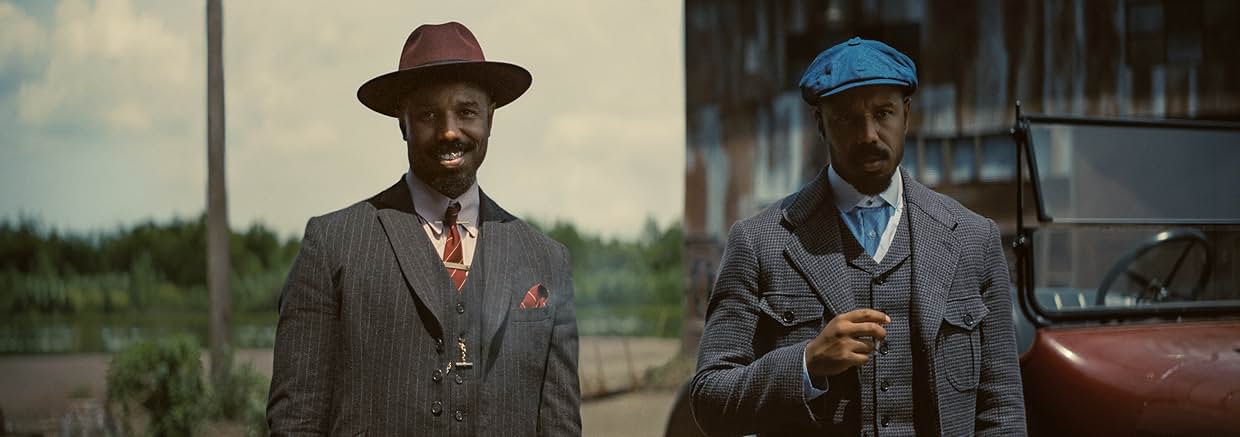“You come to me for advice, but you can’t cope with anything you don’t recognize…have to tell you something you already know but make it sound like news…” – Douglas Adams, ‘Mostly Harmless’
If you haven’t seen Sinners yet, go see Sinners. It’s maybe the first movie since Get Out where the word-of-mouth about the theater experience actually holds up, and that seems to be a near-universal sentiment among people who’ve seen it. For Get Out, the reason to see it in theaters seemed, to me at least, to be a culture-wide need to witness, together, Jordan Peele’s emergence from his chrysalis. Half of the genius behind last great Comedy Central sketch show fully morphed into the next great horror auteur? We all needed to confirm it with one another, and then witness the twists and turns of that movie together. For Sinners, it’s a little bit “THEY LET COOGLER MAKE AN ORIGINAL”1 and a lot bit “SEE AND HEAR THIS MOVIE ON A BIG SCREEN WITH BIG SPEAKERS.”
The fact that both of those movies are original horror ideas from Black men? Put a pin in that for a second.
If you haven’t seen the 2025 Wolf Man yet, I am sad to report that it is on the same level as the 2010 one: it’s fine, but you can skip it. In fact, Friend Of Mine Who Actually Starred In A Horror Film, Adam Hinkle, actually used the word “irredeemable” to me when talking Wolf Man. I’m not going that far, but I’m also not exactly eager to rewatch Wolf Man. The three lead actors are pretty wooden, and the story suffers from the same “great concept, now, are you aware that there are 11 other notes you can also play?” malaise that plagued The Invisible Man, director Leigh Whannell’s previous Universal reboot2. Both movies are a firm two and a half outta five stars, with The Invisible Man getting a boost because Elizabeth Moss rocks.
Elizabeth Moss is a great way to get back to Jordan Peele, thanks to her “Smoltz is in the bullpen now” turn throwing fireballs in the 5th-7th innings of Us. But the Jordan Peele column is coming soon. Let’s get back to Ryan Coogler.
Horror has no responsibility except to scare. Still, there’s a reason something like Sinners has more staying power—both culturally and on an individual, I’m-gonna-be-thinking-on-this-a-while level—than something like Alligator. No strays at Alligator, I love Alligator. All genre art is like this. If you love a genre (the way I love horror), you’ll eat up most anything served out. But you’ll really go all out for the stuff that is clearly trying to say something. Even Scream V3, with its snips at The Babadook and “elevated horror,” has something to say about generational trauma, the problems of depicting violence in media, and violence against women. The horror that sticks with me makes me afraid of real things—The Rental makes me afraid of surveillance technology and unregulated tech startups, just like Dracula made 19th and early 20th century Britons afraid of Catholics and women’s sexuality.

In Sinners, there is a meticulous recreation of Prohibition-era Mississippi, including faithful representations of Chinese communities in the Mississippi Delta and active participation in the film from local Choctaw. There is an opening invocation of the power of music and its ability to allow people to speak to previous generations (an opening invocation that I happen to believe in, empiricism be damned). There is incredible metaphor and meaning behind the presentation of music the movie: not just the initial meeting of Preacher Boy and Delta Slim or the awe-inspiring long shot of the juke joint full of musicians/dancers from past and present, either. Smoke weed with me and I’ll tell you about how one musical cue is meant to be a red herring invocation of white supremacy and another is meant to illustrate how Irish-American stereotypes went from criminals to cops, aka How The Irish Became White. Metaphor and music are obviously my interests, but the painstaking historical details shouldn’t go unnoticed, either. Meanwhile, in Wolf Man, the werewolf is a metaphor for the futility of prepping or trying to be a different man than your father. That’s about it.

The point I would like to make—and I would like to not be a Beach Boys-biting-Chuck-Berry guy here, the need to be “twice as good” as white counterparts is a maxim among Black people—but Ryan Coogler’s first “written and directed by” had to be this good. Look at the way the media responded: New York Times saying “Sinners Is A Big Success (With An Asterisk)”, Vulture asking if Sinners is going to make or lose money, Variety scolding that the film “has a long way toward profitability.” Never mind the fact that the movie crossed the $350 million threshold this past weekend. Never mind that those same publications were tripping over themselves to salute Quinten Tarantino and the opening weekend that Once Upon A Time In Hollywood had, despite that movie making less than Sinners in its opening weekend. Meanwhile, Wolf Man was forgettable, fine at best, despite being Universal’s millionth attempt to recapture the glory they had making monster movies 90 years ago. Did Leigh Wannell have any sleepless nights, trying to figure out how he was going to live up to such weighty expectations? Did Christopher Abbot ever psych himself up in the mirror, trying to shake off the ghost of Lon Chaney Jr.? If those things happened, it didn’t come across in the film.

My day job has meticulous sourcing policies, so I feel compelled to point out that I can’t prove counterfactuals. I can’t prove that the nebulous “THEM” that runs Hollywood4 wouldn’t let Coogler make another original film if Sinners flopped. I can’t prove that they would’ve gunpoint-forced Jordan Peele to play the poop emoji if Get Out was anything less than five outta five stars. But it sure feels like—between Get Out and Lovecraft Country and Candyman (2021) and Sinners—if a Black person is going to make horror, it needs to Say Something. Since we’re going anecdotal, my biggest memories of other people’s reaction—online or IRL—to Nope was confusion. I can’t put my finger on it, but the confusion felt like something was unsaid, like people wanted to say, “there’s no ‘I would’ve voted for Obama a third time’ or keeping the cereal and milk separate shots, but it’s a good movie.” When Mal and I saw it, I remember walking out of the theater and thinking, “sure, there’s stuff about Black horse trainers in Hollywood, but he kinda…just made a perfect alien movie. Awesome.” Mal, for her part, said, “needed more Gordy.”
Believe me, I am not complaining about these movies. I like my movies to Say Something, I like my movies to give me stuff to chew on. What I am complaining about is that it feels like Coogler had to clear a much higher bar than Leigh Whannell. A much higher bar. It’s flagrantly obvious who is directing something they care about and who is—well, not just collecting a check, but. More like one director is making a thick, veggie-packed beef stew, complete with homemade broth, while another director added scallions to instant ramen noodles and wants you to clap. And I want to see the day where Ryan Coogler and Jordan Peele and whomever else can be given carte blanche to make whatever the hell they want to make, however the hell they want to make it. Get Out and Sinners rule, but not every movie has to be those movies. And I bet Coogler or Peele could blindfold themselves and accidentally make a better movie than 2025 Wolf Man.
Sorry you got an email,
Chris
- yes, Fruitvale Station is written and directed by Coogler, but it is based on real events. Sinners, despite its attention to detail, is not a dramatization of real-life events. That we know of ↩︎
- The Invisible Man is good and you should watch it, but I should disclose that I’ve never felt like watching it a second time ↩︎
- I know it’s called Scream ↩︎
- aka the marketing department, and private equity firms ↩︎


One thought on “‘Sinners’ Is Twice As Good”